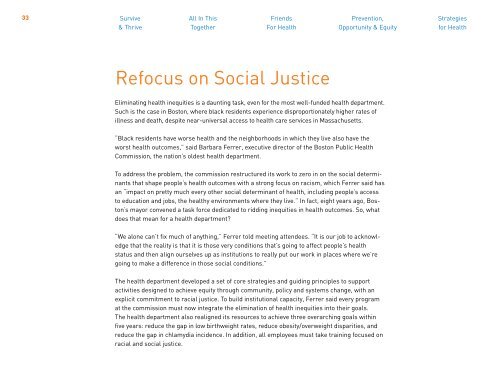INSIGHT & INSPIRATION FROM APHA’S 2012 MIDYEAR MEETING
INSIGHT & INSPIRATION FROM APHA’S 2012 MIDYEAR MEETING
INSIGHT & INSPIRATION FROM APHA’S 2012 MIDYEAR MEETING
Create successful ePaper yourself
Turn your PDF publications into a flip-book with our unique Google optimized e-Paper software.
33<br />
Survive All In This Friends Prevention, Strategies<br />
& Thrive Together For Health Opportunity & Equity for Health<br />
Refocus on Social Justice<br />
Eliminating health inequities is a daunting task, even for the most well-funded health department.<br />
Such is the case in Boston, where black residents experience disproportionately higher rates of<br />
illness and death, despite near-universal access to health care services in Massachusetts.<br />
“Black residents have worse health and the neighborhoods in which they live also have the<br />
worst health outcomes,” said Barbara Ferrer, executive director of the Boston Public Health<br />
Commission, the nation’s oldest health department.<br />
To address the problem, the commission restructured its work to zero in on the social determinants<br />
that shape people’s health outcomes with a strong focus on racism, which Ferrer said has<br />
an “impact on pretty much every other social determinant of health, including people’s access<br />
to education and jobs, the healthy environments where they live.” In fact, eight years ago, Boston’s<br />
mayor convened a task force dedicated to ridding inequities in health outcomes. So, what<br />
does that mean for a health department?<br />
“We alone can’t fix much of anything,” Ferrer told meeting attendees. “It is our job to acknowledge<br />
that the reality is that it is those very conditions that’s going to affect people’s health<br />
status and then align ourselves up as institutions to really put our work in places where we’re<br />
going to make a difference in those social conditions.”<br />
The health department developed a set of core strategies and guiding principles to support<br />
activities designed to achieve equity through community, policy and systems change, with an<br />
explicit commitment to racial justice. To build institutional capacity, Ferrer said every program<br />
at the commission must now integrate the elimination of health inequities into their goals.<br />
The health department also realigned its resources to achieve three overarching goals within<br />
five years: reduce the gap in low birthweight rates, reduce obesity/overweight disparities, and<br />
reduce the gap in chlamydia incidence. In addition, all employees must take training focused on<br />
racial and social justice.



